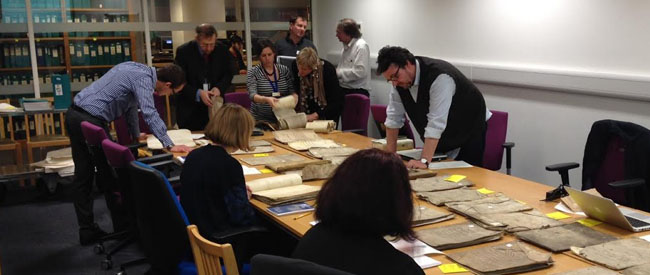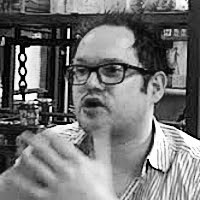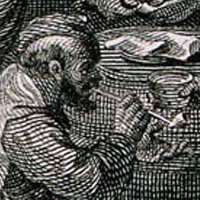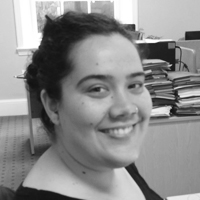Our core team consists of 3 Project Leaders, 2 Research Associates, and 2 Developers. We are supported by an Advisory Board and a wider Network of early modernists.

The core team at our inaugural methodological workshop on port books at The National Archives.
Project Leaders
Professor Phil Withington, Principal Investigator
 Phil is currently working on a number of projects related to his broad interest in the history of intoxicants and intoxication. He is also researching various aspects of early modern political culture and developing a project to produce the first properly historicized ‘early modern dictionary’. Alongside his work on Intoxicants and Early Modernity, he is in the early stages of a new book on the social history of the English Renaissance, and co-directs Sheffield’s Centre for Medical Humanities.
Phil is currently working on a number of projects related to his broad interest in the history of intoxicants and intoxication. He is also researching various aspects of early modern political culture and developing a project to produce the first properly historicized ‘early modern dictionary’. Alongside his work on Intoxicants and Early Modernity, he is in the early stages of a new book on the social history of the English Renaissance, and co-directs Sheffield’s Centre for Medical Humanities.
Dr Angela McShane, Co-Investigator
 Angela has particular expertise/interest in the material, visual, and literary strands of the project. She is Head of Renaissance and Early Modern Studies in History of Design for the joint V&A/RCA History of Design postgraduate programme. She has previously worked with Phil Withington on two connected projects: the ESRC Network Intoxicants and Intoxication in Historical and Cultural Perspective; and (also with Beat Kümin [Warwick]) a European Science Foundation international workshop on The Historical Formation of European Drinking Cultures. She is currently working on a number of projects related to her interests in the connections between drink, song and popular political culture, and the material culture of the everyday in early modern England.
Angela has particular expertise/interest in the material, visual, and literary strands of the project. She is Head of Renaissance and Early Modern Studies in History of Design for the joint V&A/RCA History of Design postgraduate programme. She has previously worked with Phil Withington on two connected projects: the ESRC Network Intoxicants and Intoxication in Historical and Cultural Perspective; and (also with Beat Kümin [Warwick]) a European Science Foundation international workshop on The Historical Formation of European Drinking Cultures. She is currently working on a number of projects related to her interests in the connections between drink, song and popular political culture, and the material culture of the everyday in early modern England.
Michael Pidd, Co-Investigator
 Michael oversees the work of HRI Digital at the University of Sheffield’s Humanities Research Institute. He has worked on approximately thirty projects as a developer, in addition to managing the delivery of the HRI’s overall portfolio. Michael’s role on the project is to oversee all technical development and undertake research into the most appropriate digital methods for capturing, representing, and interrogating the project’s many different types of sources.
Michael oversees the work of HRI Digital at the University of Sheffield’s Humanities Research Institute. He has worked on approximately thirty projects as a developer, in addition to managing the delivery of the HRI’s overall portfolio. Michael’s role on the project is to oversee all technical development and undertake research into the most appropriate digital methods for capturing, representing, and interrogating the project’s many different types of sources.
Research Associates
Dr James Brown
 James is interested in the social, economic, and cultural history of early modern England. He defended his Warwick doctorate on inns, taverns, and alehouses in the port town of Southampton in 2008, and has published on various aspects of drink and drinking in early modern urban communities. He also has interests in project management and the digital humanities, and joins Intoxicants and Early Modernity from Cultures of Knowledge: Networking the Republic of Letters, 1550-1750 at the University of Oxford, which he coordinated between 2009 and 2013. Based in Sheffield, for the project he is working on sources from Cheshire and the North West. He also designed and maintains the project website, and runs its popular Twitter feed.
James is interested in the social, economic, and cultural history of early modern England. He defended his Warwick doctorate on inns, taverns, and alehouses in the port town of Southampton in 2008, and has published on various aspects of drink and drinking in early modern urban communities. He also has interests in project management and the digital humanities, and joins Intoxicants and Early Modernity from Cultures of Knowledge: Networking the Republic of Letters, 1550-1750 at the University of Oxford, which he coordinated between 2009 and 2013. Based in Sheffield, for the project he is working on sources from Cheshire and the North West. He also designed and maintains the project website, and runs its popular Twitter feed.
Tim Wales
 Tim has worked extensively on many aspects of the social, cultural, and political history of early modern England. Most recently he has been a Research Associate on the forthcoming edition of the letters and speeches of Oliver Cromwell, to be published by Oxford University Press. His own research has explored the history of poor relief and the households of the poor, and he has recently published papers deriving from that work: ‘The Parish and the Poor in the English Revolution’, in S. Taylor & G. Tapsell (eds), The Nature of the English Revolution Revisited (Boydell Press, 2013), pp. 53-80; and ‘‘Living At Their own Hands’: Policing Poor Households and the Young in Early Modern Rural England’, Agricultural History Review 61 (2013): 19-39. He has forthcoming in early 2014 a directory of Parliamentarian army officers compiled for the Cromwell Association, to be published on British History Online. Based in London, for the project he is working on sources from Norfolk.
Tim has worked extensively on many aspects of the social, cultural, and political history of early modern England. Most recently he has been a Research Associate on the forthcoming edition of the letters and speeches of Oliver Cromwell, to be published by Oxford University Press. His own research has explored the history of poor relief and the households of the poor, and he has recently published papers deriving from that work: ‘The Parish and the Poor in the English Revolution’, in S. Taylor & G. Tapsell (eds), The Nature of the English Revolution Revisited (Boydell Press, 2013), pp. 53-80; and ‘‘Living At Their own Hands’: Policing Poor Households and the Young in Early Modern Rural England’, Agricultural History Review 61 (2013): 19-39. He has forthcoming in early 2014 a directory of Parliamentarian army officers compiled for the Cromwell Association, to be published on British History Online. Based in London, for the project he is working on sources from Norfolk.
Digital Humanities Developers
Katherine Rogers
 Katherine is based in the Humanities Research Institute at the University of Sheffield, developing software for projects based there. Since joining the HRI, Kathy has worked on over fifteen digital humanities projects including Bess of Hardwick’s Letters, Manuscripts Online, and Connected Histories.
Katherine is based in the Humanities Research Institute at the University of Sheffield, developing software for projects based there. Since joining the HRI, Kathy has worked on over fifteen digital humanities projects including Bess of Hardwick’s Letters, Manuscripts Online, and Connected Histories.
Jamie McLaughlin
 Jamie is based in the Humanities Research Institute at the University of Sheffield, developing software for projects based there. Since joining the HRI, Jamie has worked on over twenty digital humanities projects including the Hartlib Papers, Locating London’s Past, and The Old Bailey Proceedings. His present areas of interest include automated data linkage, 3D visualisation, and WebGL.
Jamie is based in the Humanities Research Institute at the University of Sheffield, developing software for projects based there. Since joining the HRI, Jamie has worked on over twenty digital humanities projects including the Hartlib Papers, Locating London’s Past, and The Old Bailey Proceedings. His present areas of interest include automated data linkage, 3D visualisation, and WebGL.
Interns
Dr Rachel Askew
 Rachel is assisting the project by reconciling archaeological, art historical, and museological terms for intoxicant-related objects with the descriptions derived from our sources. She has a particular interest in the material culture of consumption, having successfully completed her doctorate on eating and drinking in castles during the English Civil War at the University of Sheffield in 2013. As well as publishing papers on various aspects of social behaviour during the conflict, she has worked on various projects at the University of Sheffield, including the Newark Civil War Project, and has also conducted research on the development of Sheffield during the early modern period for the Sheffield Lives inititative (download her walking tour app!).
Rachel is assisting the project by reconciling archaeological, art historical, and museological terms for intoxicant-related objects with the descriptions derived from our sources. She has a particular interest in the material culture of consumption, having successfully completed her doctorate on eating and drinking in castles during the English Civil War at the University of Sheffield in 2013. As well as publishing papers on various aspects of social behaviour during the conflict, she has worked on various projects at the University of Sheffield, including the Newark Civil War Project, and has also conducted research on the development of Sheffield during the early modern period for the Sheffield Lives inititative (download her walking tour app!).
Dr Kate Davison
 Kate is assisting the project with proof-reading and data cleaning transcriptions. She completed her PhD at the University of Sheffield in 2016 on humour and laughter in early modern England, focusing in particular on the satirist and tavern-keeper, Edward ‘Ned’ Ward (1666-1731). Before arriving in Sheffield, Kate completed an MPhil in Early Modern History at Cambridge (2012) and a BA in History at Exeter (2011). Kate has published on the place of laughter in gentlemanly sociability, and is currently working on articles and a book resulting from her doctoral research. She also has an interest in digital humanities and methodologies for exploring historical social networks.
Kate is assisting the project with proof-reading and data cleaning transcriptions. She completed her PhD at the University of Sheffield in 2016 on humour and laughter in early modern England, focusing in particular on the satirist and tavern-keeper, Edward ‘Ned’ Ward (1666-1731). Before arriving in Sheffield, Kate completed an MPhil in Early Modern History at Cambridge (2012) and a BA in History at Exeter (2011). Kate has published on the place of laughter in gentlemanly sociability, and is currently working on articles and a book resulting from her doctoral research. She also has an interest in digital humanities and methodologies for exploring historical social networks.
Alex Taylor
 Alex is assisting the project with the data capture and analysis of port books. He is currently at the end of the second year of his PhD. His own research focuses on the wholesale trade, the distribution and the retail trade of tobacco during the seventeenth century, with a special interest in the ‘illicit’ components thereof. A long-time affiliate of the University of Sheffield, Alex also took his BA and MA degrees here.
Alex is assisting the project with the data capture and analysis of port books. He is currently at the end of the second year of his PhD. His own research focuses on the wholesale trade, the distribution and the retail trade of tobacco during the seventeenth century, with a special interest in the ‘illicit’ components thereof. A long-time affiliate of the University of Sheffield, Alex also took his BA and MA degrees here.
Alumni
Dr Iona Hine
 Iona was affiliated to the project between Spring and Summer 2014 and assisted with our work on ecclesiastical court records. Her thesis, Englishing the Bible in Early Modern Europe (University of Sheffield, 2014), combined linguistics, theology, and social history to show that in English as in other languages, ideological concerns tended to outweigh linguistic expertise in the evaluation of good vernacular translation. She has an MA in Jewish-Christian Relations (CJCR/APU, 2003), a BA in Theology and Religious Studies (Cambridge, 2001), and a PGCE in Secondary Religious Studies. She has published on biblical literacy, drawing comparisons between early modern and current rhetoric. Based in Sheffield, Iona is currently a Research Associate on Linguistic DNA: Modelling Concepts and Semantic Change in English, 1500-1800. She also coordinates the Sheffield Centre for Early Modern Studies.
Iona was affiliated to the project between Spring and Summer 2014 and assisted with our work on ecclesiastical court records. Her thesis, Englishing the Bible in Early Modern Europe (University of Sheffield, 2014), combined linguistics, theology, and social history to show that in English as in other languages, ideological concerns tended to outweigh linguistic expertise in the evaluation of good vernacular translation. She has an MA in Jewish-Christian Relations (CJCR/APU, 2003), a BA in Theology and Religious Studies (Cambridge, 2001), and a PGCE in Secondary Religious Studies. She has published on biblical literacy, drawing comparisons between early modern and current rhetoric. Based in Sheffield, Iona is currently a Research Associate on Linguistic DNA: Modelling Concepts and Semantic Change in English, 1500-1800. She also coordinates the Sheffield Centre for Early Modern Studies.
Muriel Munguia
 Muriel was an intern with HRI Digital at the Humanities Research Institute during Spring 2016, and assisted the project with its analysis of probate inventories. She is currently pursuing an MA in Librarianship at the University of Sheffield, after which she hopes to work in special and/or digital collections. Before beginning her MA, Muriel worked at The Huntington Library as a reader services assistant in Ahmanson Reading Room, and completed metadata entry for the Native American Photographs Project in the Huntington Digital Library.
Muriel was an intern with HRI Digital at the Humanities Research Institute during Spring 2016, and assisted the project with its analysis of probate inventories. She is currently pursuing an MA in Librarianship at the University of Sheffield, after which she hopes to work in special and/or digital collections. Before beginning her MA, Muriel worked at The Huntington Library as a reader services assistant in Ahmanson Reading Room, and completed metadata entry for the Native American Photographs Project in the Huntington Digital Library.
